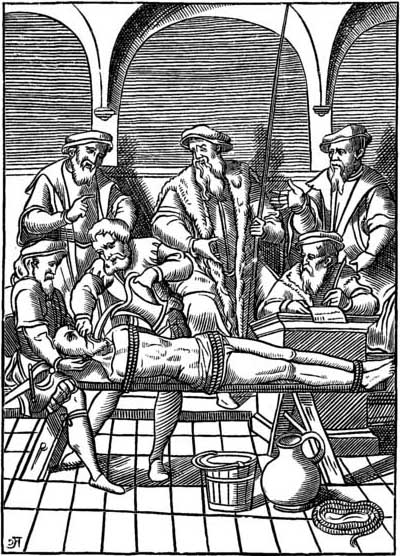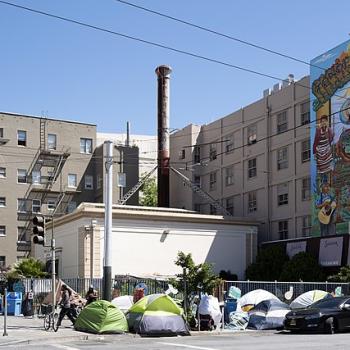I agree with what my friend Christopher Blosser had to say in his article in First Things:
I have little respect for those who cavalierly lobby in defense of waterboarding — or, for that matter, those who who bring a cudgel to the discussion — tar-and-feathering as the “Rubber Hose Right” (to borrow one well-known term) anyone who raises doubts about fundamentalist proof-texting from John Paul II’s Veritatis Splendour that torture, like slavery, is “intrinsically evil”, end of story. (Cardinal Dulles noted himself in First Things danger of approaching that particular passage in such a manner ).
I have considerably more respect for Catholic apologists like Jimmy Akin and Fr. Harrison, who address the issue with humility and trepidation, acknowledging the lack of clarity. Father Harrison in particular can be commended for taking into account the width and breadth of Church history and papal teaching.
Nonetheless, it has been five years of predominantly lay Catholics — some very prominent — in open dispute and confusion on the matter. The positions of both sides has been articulated such that, every time this debate resurfaces in the blogging world, one can predict from memory the various points raised and tactics employed.
I also strongly agree with Jimmy Akin’s statement in one of his excellent, characteristically thoughtful and measured articles on the topic (from October 2006):
I haven’t been keeping up with this debate, including what Mark [Shea] has written about it, . . . I have briefly chatted with Mark about the matter, and my impression is that his position is within the permitted range of Catholic moral thought on this, though his is not the only position within the permitted range of Catholic moral thought.
Briefly, as to my position: yes, of course I (with the Church) oppose torture as intrinsically evil. The relevant question to be discussed, however, is: “what is torture in the first place?” It comes down to definition. And that discussion is (surprisingly or not) an immensely complex one, not simple and absolutely clear-cut as many people seem to be asserting in the present hothouse [so-called, pseudo] “debates” [choke] on the topic.
This is what Fr. Harrison, Jimmy Akin, and Christopher Blosser recognize and deal with in their treatments: where the serious, adult conversation truly lies, and that’s why their articles are worth anyone’s time to work through and ponder. Don’t just read the mutual recriminations and shouting matches. Ignore them like the plague, is my advice (for whatever it is worth).
Someone has to try to foster calm, rational discussion on this topic. What goes on in so many venues is both outrageous and ridiculous. Little is accomplished and folks become estranged on a stupid basis, having (in many cases) mutually misunderstood each other’s position all along, or with one party demonizing the other on inadequate (and most uncharitable) grounds from the get-go.
Not all interrogation is torture. Some no doubt is (as secular organizations obviously do not always follow Catholic ethics). I imagine that likely some is, in point of fact, as to what has occurred. I don’t claim to know all the answers and ins and outs of this (anymore than Fr. Harrison and Jimmy Akin do or claim to have). I think very few make that claim or do in fact know the answers.
But I know that there are lines here that can be rationally discussed within an orthodox Catholic, magisterial perspective as to the ethical character of different actions. My position is partly agnostic: it’s a complex ethical matter and thus it is all the more the case that we ought not to demonize one another. It’s the demonization and hyper-polemicizing of the issue that I detest.
It’s the Church’s job to fully clarify vexed issues. I then go out and defend what Holy Mother Church has definitively taught. Until then, there is room for different opinions (except in the mind of legalistic, obsessed fanatics).
I think actual moral theologians in the Church ought to clarify it, not me. I’m not qualified. This is a very complex issue. If Fr. Harrison isn’t good enough for the ranting fanatics going on and on about this (or Jimmy Akin, if we want to cite a lay apologist), sure as Hades whatever I decided wouldn’t be sufficient for anyone. It doesn’t matter what opinion I have on this if the Church hasn’t made it clear.
What is crystal clear is that laymen who are not the magisterium are not the magisterium. That’s the first rule of logic: a = a.
I wrote on 21 January 2015, in response to an assertion that the Church is against torture:
Absolutely. This is why I wholeheartedly agree that torture is intrinsically evil (the Church has made that quite clear). I would like to see the Church define more specifically which particular acts are torture. Until then, I reserve judgment as to all particulars and specifics and don’t claim to know or pronounce upon all particulars on the matter (precisely because I am simply a lay apologist, etc.).
Moreover, on the same basis, I am not subject to the condemnatory pontifications of [Name] and/or any other non-magisterial laypeople who claim to dogmatically “know” all these particulars.
On 31 January 2015, I changed my mind insofar as I now think that waterboarding is an abuse and should never be done, but I still don’t regard it as torture, as explained in a Facebook post.
Here are the further resources (if other articles of a similar dispassionate, non-polemical nature are discovered, I will gladly add them to the list):
Waterboarding: Pro and Con [extensive discussion on my Facebook page as to whether it is “torture” and therefore, intrinsically wrong; 5 May 2014; 448 comments]
Clarification of My Position on the Torture / Interrogation Issue [Facebook, 30 Dec. 2014 + very lengthy and civil discussion, with 1,013 comments] [See also a second follow-up Facebook discussion, with 357 comments]
Sick and Tired of Controversy [Facebook, 6 January 2015]
Lies About My Position Regarding Torture and Waterboarding [26 January 2015; see also accompanying Facebook discussion]
“Live Chat” Exchange with Mark Shea on Waterboarding [30 January 2015; see also accompanying Facebook discussion]
Waterboarding: How and Why I Changed My Mind [Facebook, 31 January 2015]
Sounds Like the Infamous “Orthodoxy Cops” Today! [Facebook, 22 March 2015]
Mark Shea Has Managed Yet Again to Absurdly Misrepresent Me Regarding the Waterboarding Issue (See the Ensuing Exchange) [Facebook, 25 March 2015]
Exhibit #4,8762,190 Proving that Mark Shea is Clueless When it Comes to 1) Accurately Conveying What Anyone Who Strongly Disagrees with Him Actually Believes; 2) Remembering What Happened in Ancient History (the Previous Month) with Said Persons, and 3) What Waterboarding IS [Facebook, 23 April 2015]
“It’s Just So Obvious!”: The Case of Torture (Dr. Edward Feser, What’s Wrong With the World, 2 May 2009; a fantastic article and great comments in the long combox, too)
Torture and Punishment as a Problem in Catholic Moral Theology: Part I. The Witness of Sacred Scripture (Fr. Brian W. Harrison)
Torture and Punishment as a Problem in Catholic Moral Theology: Part II. The Witness of Tradition and Magisterium (Fr. Brian W. Harrison)
Clarification on the Definition of “Torture” (Fr. Brian W. Harrison)
The Church and Torture (Fr. Brian W. Harrison, This Rock, Dec. 2006)
What About Torture? (Jimmy Akin, 28 June 2004)
Doubts About Torture (Jimmy Akin, 26 Oct. 2006)
Defining Torture: An Initial Exploration (Jimmy Akin, Nov. 2006)
Defining Torture: Proposing A Definition (Jimmy Akin, Nov. 2006)
Dedining Torture: Two Parameters (Jimmy Akin, Nov. 2006)
Defining Torture: One More Thought (Jimmy Akin, Nov. 2006)
Intrinsic Evil (Jimmy Akin, Nov. 2006)
‘Tiresome’ anti-torturers (Todd M. Aglialoro, Crisis Magazine, 25 Jan. 2010)
What About Waterboarding? (Todd M. Aglialoro, Catholic Answers Blog, 1 May 2014)
Waterboarding Reconsidered (Michelle Arnold, Catholic Answers Blog, 3 May 2014) [reply to the article above it]
On Torture, “Aggressive Interrogation” and The Military Commissions Act of 2006
(Christopher Blosser, Against the Grain, 2 Oct. 2006)
“The Torture Debate” – Part III (Christopher Blosser, Against the Grain, 15 Oct. 2006)
The Torture Debate – Pt. IV (Roundup) (Christopher Blosser, Against the Grain, 26 Oct. 2006)
So what do I think about Torture? (Christopher Blosser, Against the Grain, 12 Nov. 2006)
Mark Shea, Jimmy Akin, Fr. Harrison and the “Torture Debate” (Christopher Blosser, Against the Grain, 14 Nov. 2006)
Rewarding Bad Behavior? On Fr. Neuhaus and Mark Shea (Christopher Blosser, Against the Grain, 14 June 2007)
Torture in the News (Christopher Blosser, Against the Grain, 23 Dec. 2008)
A Brief response to Mark Shea (Christopher Blosser, Against the Grain, 29 Jan. 2009)
Separating the Wheat from the Chaff in the Great Torture Debate (Christopher Blosser, The American Catholic, 22 Jan. 2010)
Catholic Advocacy of Torture: A Teaching Moment for the Catholic Bishops? (Christopher Blosser, First Things, 12 Feb. 2010)
Waterboarding is for Pansies (Christopher Blosser, Against the Grain, 24 May 2011)
Interrogational Torture (Patrick Lee, American Journal of Jurisprudence: Vol. 51: Issue 1, Article 5; 2006)
Rick Santorum: “I Do Not Believe [Enhanced Interrogation] is Torture” (Lisa Graas, The American Catholic, 19 May 2011)
“Torture” and the Pro-Life Cause (Austin Ruse, The Catholic Thing, 18 Feb. 2010)
Abortion, Torture, and the Juice-Box Theologians (Austin Ruse, Crisis Magazine, 30 Jan. 2015)
Waterboarding, Torture, and Me (Dennis Bartlett, The Catholic Thing, 20 May 2009)
Torture: Historical and Ethical Perspectives (Unam Sanctam Catholicam website, Dec. 2014; superb and very helpful historical survey; comes down against CIA practices, including — presumably — waterboarding)
The Catholic Defender: The Torture Debate (Donald Hartley, Deeper Truth, 31 Jan. 2015)
[see also the accompanying Facebook discussion]














